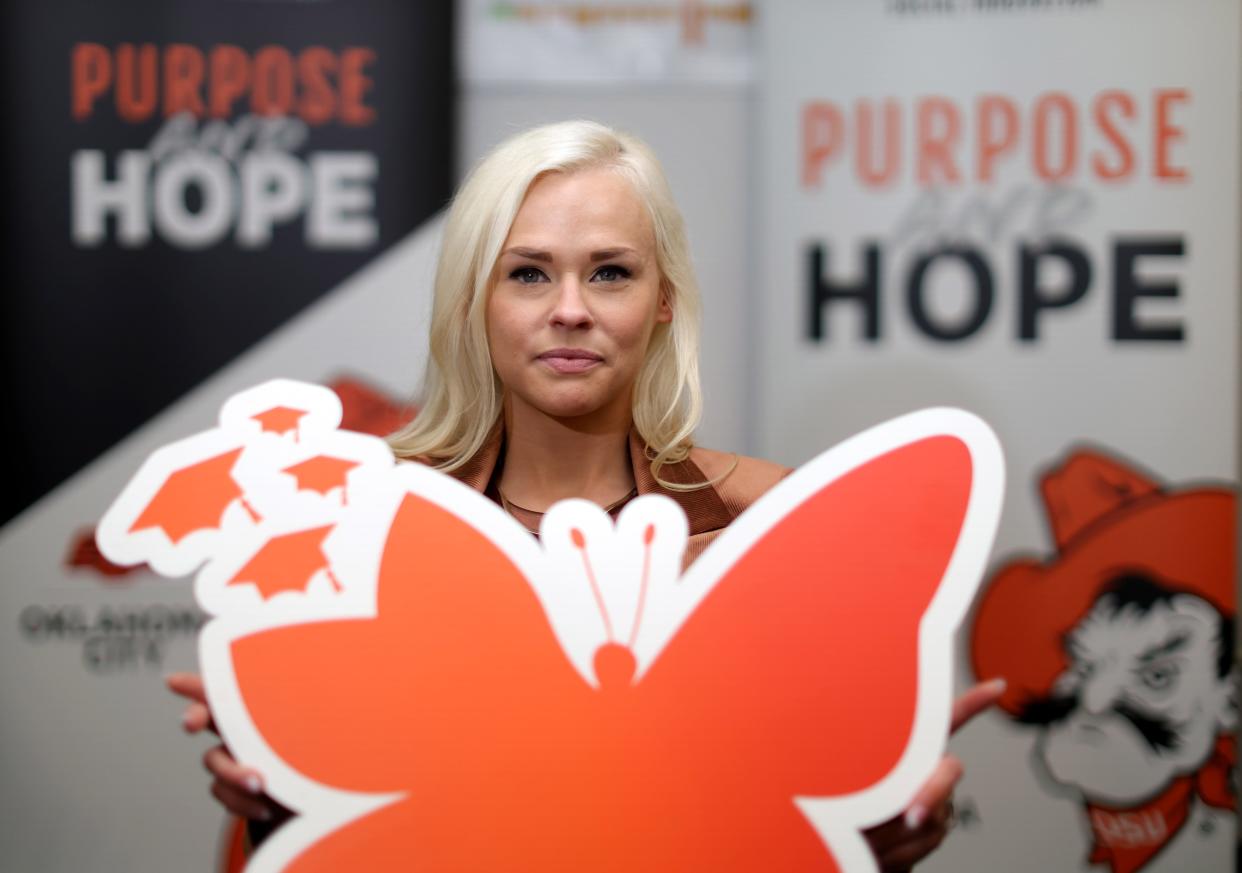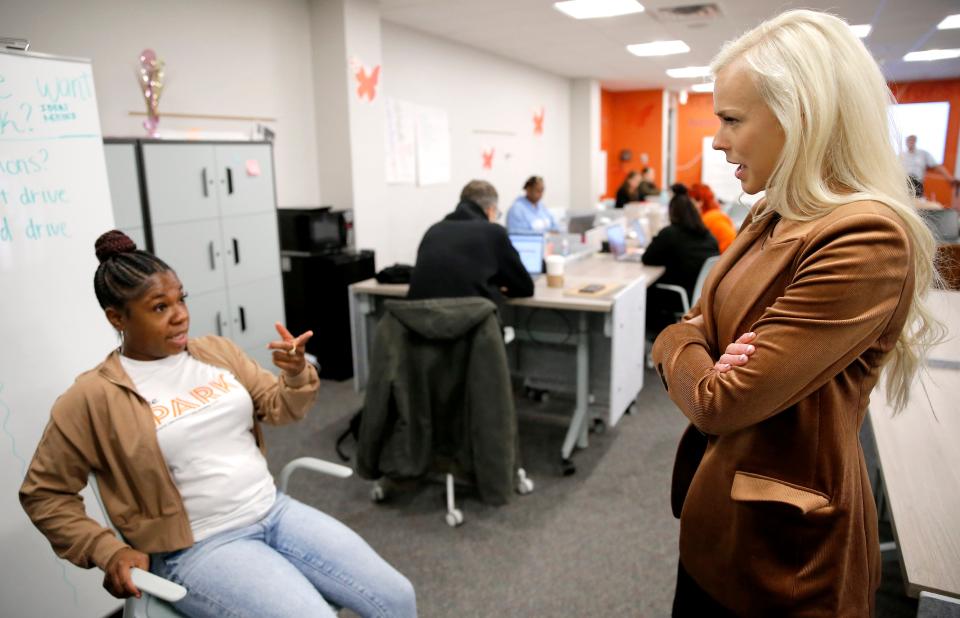'Re-imagine what is possible': How an OSU-OKC program is helping turn around lives

Gathered around a laptop in an Oklahoma State University-Oklahoma City classroom on a recent Tuesday morning, several women shook their heads and shared jokes about what they saw on the screen — a website with jail mugshots from across the country, including their own.
“You were so young,” one woman said.
“There’s so many,” another said.
“”Wait, there’s a page two,” a third woman said.
After the laughter, the women each went back to their desks and continued their work as part of the Center for Social Innovation, described as a workforce development program that provides post-secondary education and training for Oklahomans who have recently experienced incarceration, homelessness, domestic violence, addiction or other trauma.
The center launched in 2020 with a 3-year, $1 million starting grant from the E.L. and Thelma Gaylord Foundation and partnerships with nonprofits throughout the metro area.
Of the 16 students who completed the program most recently, none have re-offended and 15 are continuing their education.
Thirteen students reported employment after finishing the program. The program reports that the average income of those students rose from a little more than $10,800 to more than $33,900. The Gaylord Foundation has approved another round of funding for the program, Trustee Tricia L. Everest said.
“CFSI is doing remarkable work threading the skillsets for people to succeed in education, employment and thrive in all working conditions,” Everest said. “I am grateful to all the nonprofits and entities investing in CFSI.”

Program aims to help plan for a life after achieving sobriety
Ariel Moore, the program’s senior director, has had her own mugshots taken. Moore hit rock bottom with an opioid addiction in 2016, when Bethany police raided a house where she lived with her infant son and other drug users.
“I just spent a lot of days and nights in that house just praying that God would save me,” Moore said. “It got to a point, my life was so terrible and I'd be holding this baby and I just wanted a different life for him. Feb. 1, 2016, Bethany Police Department came and kicked in the door and arrested me and whoever else was in that house and took the baby. So that was God’s answer to my prayer.”
Faced with losing custody of her son, Moore entered ReMerge, a comprehensive female diversion program offering an alternative to incarceration for pregnant women or mothers with young children.
Terri Woodland, former director for ReMerge, recalled Moore taking advantage of every opportunity the program offered her, and becoming a cheerleader for other women.
More: A court diversion program saved his life. Now he guides others through the program
“She was and is a true leader and always focuses on helping prerogative opportunities for others,” Woodland said. “She is a joy to be around and has a way of making others believe they can be successful.”
Now 32, married and with a second child, Moore shared her vision for the Center for Social Innovation.
“My hope for this program is that we become a beacon of hope for the recovery community — that they can do more than just get sober,” she said. “Because that’s great, but getting sober is not the end-all, be-all. That’s not gonna be the thing that makes you feel like you have purpose 10 years from now. Life is so much more than that. You need something fulfilling. You need something that makes you feel like a whole person, that you have purpose. And we want to give people who have been through really hard things to have purpose and hope.”
How does the Center for Social Innovation work?
Still, Moore cautioned, the program, which lasts two semesters and typically starts with about 35 people each session, isn’t for everyone.
Applicants are interviewed by a panel of seven people looking for those who are committed to higher education, being coached and receiving accountability in a like-minded community of people turning their lives around. In other words, doers over talkers.
“This isn’t for the majority of people who have the drug background,” Moore said. “It’s just not. It’s hard. Higher education is one of the hardest things anyone will ever do, especially with people who are adverse to challenge.”
Program participants not only get help for school, but they learn communication and other skills that will help prepare them for the workplace. When a participant finds an internship, the program pays their wages.
Meanwhile, leaders are available to help during a crisis, like when a car breaks down, food runs out or emergency bills need to be paid.
In the classroom, participants look to Moore for direction and encouragement.
More: Oklahoma's Narcan vending machines have dispensed thousands of life-saving doses in six months
She told one student seeking advice:
“In the beginning, don’t get married to any one thing. Let your future open up to you.”
LaDawna McMichael is a 46-year-old program participant who is studying accounting and counseling while holding down a job and abstaining from the drug life that repeatedly sucked her into the criminal justice system.
“When we don’t believe in ourselves, having one person like Ariel believe in us — it’s like a plant — each person she touches, it’s like a seed. We’re just blossoming into beautiful flowers,” McMichael said. “I didn’t believe in myself before this program. There’s no obstacle too big enough for us to knock down.”
Other students have become leaders in the Center for Social Innovation.
Among them is John Standfill, 49. He spent a total of 17 years in prison for various drug-related charges.
In prison, Standfill said, he learned to deal with his emotions and tough environments. A key part of success in the program, say Standfill and others, is cutting off toxic relationships that lead to relapses into destructive behavior.
“I came out of prison with a different mentality,” Standfill said. “I just focused on myself. I just separated myself from everybody and everything and just focused on this.”
Ryan Blackwell, 37, is another leader in the program.
While shedding familiar relationships can be difficult, Blackwell said, places like the Center for Social Innovation offer a new community built on positivity and achievement.
For those who are committed to the program, the jail mugshot can be a painful — and sometimes darkly humorous — symbol of a transformed life.
“You’re definitely not alone,” Blackwell said. “We’ve been there. We’ve lived that. We can look at it and know that’s not who that person really is.”
Moore looked up her own mugshots. She remembered a missing tooth. Smiled at her disheveled hair. Pondered a life renewed.
“When you’re standing on that side of it, the picture side of it, you don’t see that,” Moore said. “You see a demon. And I understand that because most stories probably don't turn out well ... that person in the picture, they need help.”
Some of that help can be found at the Center for Social Innovation.
“It gives people a starting place to re-imagine what is possible,” Moore said.
This article originally appeared on Oklahoman: OSU-OKC program helps students find their future with sobriety

